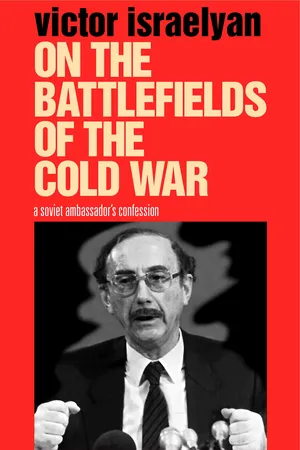
- 432 pages
- English
- PDF
- Available on iOS & Android
About this book
"Memoirs are worthless if their authors attempt to present themselves as angels. I resolutely oppose those of my countrymen who shift responsibility for Soviet evils exclusively to the leaders. It is important that each Soviet citizen realize and admit his or her share of the responsibility." —from On the Battlefields of the Cold War
For more than forty years Victor Israelyan served in the Soviet Ministry of Foreign Affairs, rising through the ranks to become one of the Soviet Union's leading diplomats specializing in disarmament negotiations. He was forced to retire in 1987, a casualty of a system that was about to collapse under the weight of its contradictions. On the Battlefields of the Cold War offers unique insight into the volatile inner workings of the Soviet Foreign Ministry, where the battle lines of the Cold War were often first drawn.
Israelyan has no patience for those of his compatriots who argue that Soviet foreign policy was ultimately just, save for a few "aberrations" such as the invasions of Hungary, Czechoslovakia, and Afghanistan. These acts were intrinsic to the system, and without them the mighty Soviet Union would not have existed as long as it did. The very foundation of Soviet foreign policy, therefore, was untenable, and the entire structure it supported was destined to implode.
Israelyan brings to this memoir a wealth of experience, having worked with all the postwar Soviet foreign ministers—from Molotov and Vyshinsky to Gromyko and Shevardnadze—and established diplomatic ties to the West, particularly to the United States. As part of the middle tier of the diplomatic hierarchy, he was privy both to meetings of the Collegium of the Foreign Ministry as well as to the many informal, private discussions among rank-and-file diplomats. Israelyan explains how he and his colleagues, as faithful defenders of Soviet ideology, viewed the United States, the Soviet Union's main adversary and partner. He tells of distinct factions within the Soviet foreign policy apparatus—factions that Soviet leaders sought to hide, fearing that any internal divisions might be interpreted by outsiders as discord. This aging Cold Warrior—one who accepts that he belonged to the party that lost the war—relates a deeply human story whose legacy continues today.
Frequently asked questions
- Essential is ideal for learners and professionals who enjoy exploring a wide range of subjects. Access the Essential Library with 800,000+ trusted titles and best-sellers across business, personal growth, and the humanities. Includes unlimited reading time and Standard Read Aloud voice.
- Complete: Perfect for advanced learners and researchers needing full, unrestricted access. Unlock 1.4M+ books across hundreds of subjects, including academic and specialized titles. The Complete Plan also includes advanced features like Premium Read Aloud and Research Assistant.
Please note we cannot support devices running on iOS 13 and Android 7 or earlier. Learn more about using the app.
Information
Table of contents
- COVER Front
- Copyright Page
- Table of CONTENTS
- Chapter 1: TRAINING FOR THE COLD WAR
- Chapter 2: THE FIRST COLLISONS OF THE WAR
- Chapter 3: STALIN IS DEAD. WHAT NEXT?
- Chapter 4: SOWING THE SEEDS OF HATRED IN HUNGARY
- Chapter 5: THE KHRUSHCHEV STYLE OF DIPOLOMACY
- Chapter 6: THAWS AND FROSTS
- Chapter 7: ON THE DIPLOMATIC SIDELINES
- Chapter 8: THE BATTLEFIELD THE UN
- Chapter 9: THE SOVIET UNION'S 105TH VETO
- Chapter 10: THE COLD WAR ON THE MIDDLE EAST FRONT
- Chapter 11: CHINA _ A NEW FRONT IN THE COLD WAR
- Chapter 12: TIME TO GO HOME
- Chapter 13: THE SOVIET DIPLOMATIC HEADQUARTERS AT SMOLENSKAYA SQUARE
- Chapter 14: AN UNEASY TRUUCE IN THE COLD WAR
- Chapter 15: THE APOTHEOSIS OF THE COLD WAR
- Chapter 16: MARKING TIME
- Chapter 17: THE BEGINNING OF THE END OF THE COLD WAR WAR
- Chapter 18: FEIGNED FRENDSHIP
- Chapter 19: FARWELL TO THE COLD WAR WAR
- I N D E X